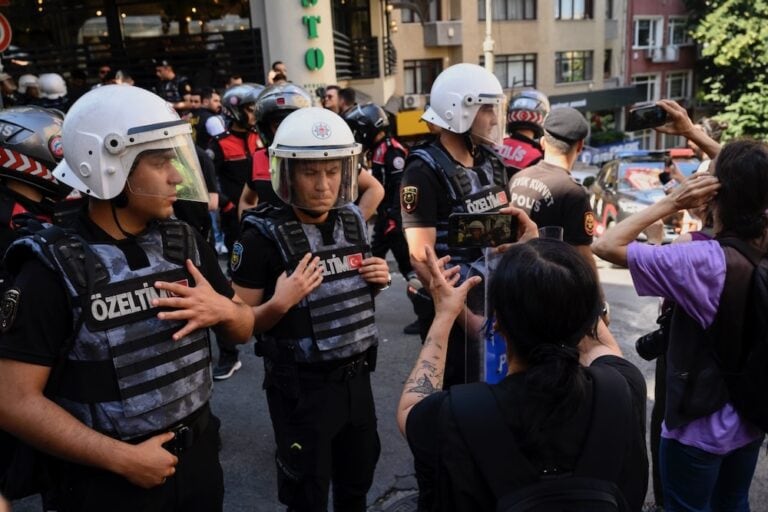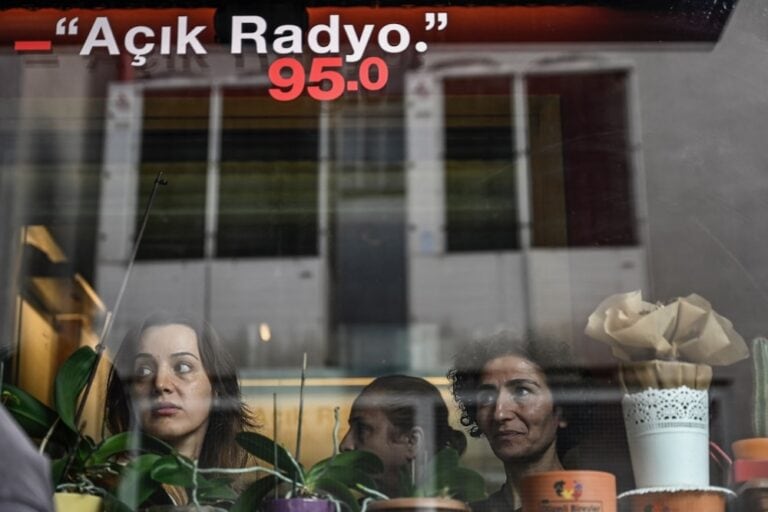Ahead of Turkey's presidential and parliamentary elections on 14 May, RSF makes 15 press freedom recommendations for the future president, government ministers and parliamentarians.
This statement was originally published on rsf.org on 5 April 2023.
Reporters Without Borders (RSF) calls on the candidates in Turkey’s presidential and parliamentary elections on 14 May to demonstrate a commitment to defend press freedom, which has been undermined for the past 20 years. To this end, RSF is submitting 15 recommendations for the future president, government ministers and parliamentarians.
RSF hopes that these 15 judicial, legislative, regulatory and political recommendations will be the subject of public debate during the election campaign and will then be implemented by those who are elected.
The recommendations invite the candidates to actively defend press freedom by restoring the judicial system’s independence and autonomy, and reforming the legislative framework so that it protects journalists and media independence.
RSF urges politicians to stop misusing the penal code and counter-terrorism legislation against journalists, to guarantee the independence and impartiality of the entities that regulate the media (including the broadcasting authority and Press Card Commission), and to combat attacks against journalists.
Media weakened, polarised by authoritarianism
After 15 years of democratic reforms with a view to joining the European Union, everything may have to be redone because authoritarianism has gained so much ground during the past decade, to the point that media pluralism is being called into question more than ever, and no holds are barred in attacks on the government’s critics.
Although 90% of the national media are now under government control, the courts and the so-called self-regulatory media bodies such as the High Council for Broadcasting (RTÜK), the Press Card Commission and the State Advertising Distribution Agency (BIK) continue to undermine what remain of critical media outlets.
The hyper-presidential system established by President Recep Tayyip Erdogan since 2018 has not only destroyed the autonomy of these institutions but had also brought the judicial system under its complete control. Turkey’s counter-terrorism legislation and criminal code have been used to prosecute no fewer than 200 media representatives in connection with their work. They include at least 73 journalists who have been given prison sentences or fined for “insulting the president” since August 2014, when Erdogan was elected president.
Recommendations for candidates
Turkey’s presidential and parliamentary elections
Reporters Without Borders (RSF) calls on the candidates in Turkey’s presidential and parliamentary elections to defend the right to news and information and to support the restoration of an environment that protects press freedom, which has been undermined for the past 20 years. To this end, RSF urges them to publicly undertake to implement the following 15 recommendations if they are elected, and to promote them during their campaign.
RSF calls in particular for active defence of press freedom, restoration of a judicial system that protects journalists, and adoption of a legislative and regulatory framework guaranteeing media freedom and independence.
A – Restore the judicial system’s independence and autonomy, so that it functions as a guarantor of freedoms, including press freedom and journalistic freedom
1. Ensure judicial independence and autonomy
– In particular, guarantee the independence of the Supreme Council of the Judiciary in order to end political interference in cases involving journalists (including interference in matters of judicial appointments and disciplinary measures against judges and prosecutors)
– Also guarantee the independence of justices of the peace and modify their powers in order to prevent abuses involving arrests and imprisonment of journalists and Internet censorship.
2. Respect the primacy of European Court of Human Rights case law and the Turkish Constitutional Court’s rulings, as established in Turkey’s 1982 constitution, in order to safeguard respect for press freedom and the right to news and information.
3. Provide judges, magistrates and police investigators with press freedom training that focuses in particular on European Court of Human Rights case law and the Turkish constitutional court’s rulings, in order to ensure practices and procedures that respect freedom of expression and press freedom.
B – Overhaul the legislative framework in order to reinforce press freedom and stop misuse of the criminal code against journalists
4. Ensure that criminal and counter-terrorism laws cannot be used against journalists and other sources of independent or critical reporting and opinion.
5. Overhaul the criminal code in order to safeguard respect for press freedom: repeal articles about “insulting the president” and “denigrating state institutions”; decriminalise insult and defamation (in line with the Venice Commission’s recommendations): and revise article 217-A on disinformation.
6. Reinforce legislation on the right of access to state-held information.
7. Reinforce legislation on protecting journalists against SLAPPs (gag-suits).
C – Establish a regulatory framework that safeguards media independence
8. Guarantee the independence and impartiality of the bodies in charge of media regulation – the High Council for Broadcasting (RTÜK), the Press Card Commission and the State Advertising Distribution Agency (BIK) – and free them from any form of political control, including control by the government.
9. Establish a transparent regulatory framework to prevent political interference in media ownership.
D – Implement an active press freedom defence policy
10. Systematically and publicly condemn physical attacks on journalists and ensure that all attacks are the subject of systematic criminal investigation so that the perpetrators are identified and prosecuted.
11. In the strongest terms, denounce verbal attacks on journalists and attempts to discredit them by politicians of all categories, including attacks by members of one’s own party.
12. Put an end to the inappropriate use of international procedures (including Interpol Red Notices and requests for international judicial cooperation) that target foreign journalists or journalists who have fled the country.
13. Respond to questions and requests for information from the media in an open and fair manner, which will help to ensure pluralistic, accurate and balanced media coverage.
14. Review the practices and functioning of parliamentary hearings in order to ensure that questions put to the government by parliamentarians, especially those concerning press freedom, are dealt with effectively and are not ignored.
15. Strengthen the role of parliamentary commissions of inquiry into the situation of the media and killings of journalists.
Turkey is ranked 149th out of 180 countries in RSF’s 2022 World Press Freedom Index.



